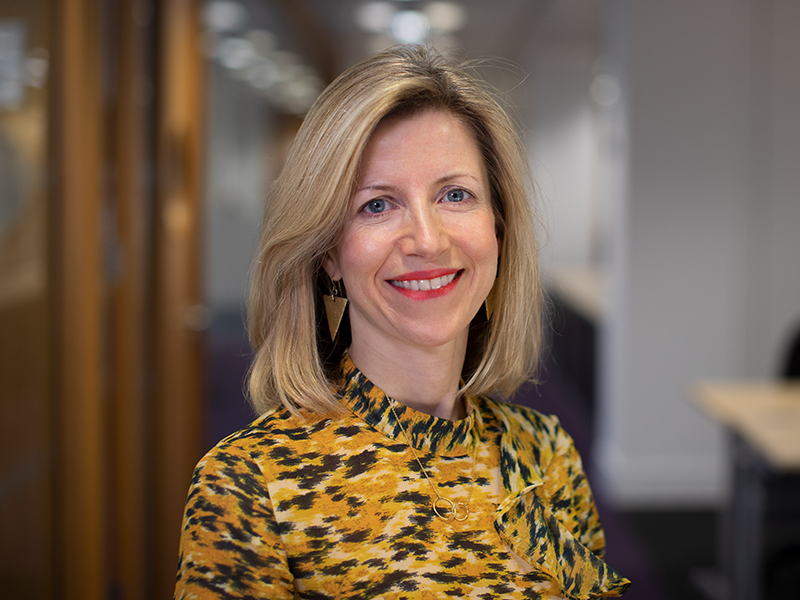 Sarah Woolnough took on the mantle as CEO of Asthma + Lung UK, the UK’s leading lung charity in 2020, and faced significant challenges. Demand for the charity’s services skyrocketed due to COVID-19, fundraising potential was stunted with a reduction of in-person events and there was a need to rebrand. Sarah explains her top tips on how she managed this change to achieve huge success.
Sarah Woolnough took on the mantle as CEO of Asthma + Lung UK, the UK’s leading lung charity in 2020, and faced significant challenges. Demand for the charity’s services skyrocketed due to COVID-19, fundraising potential was stunted with a reduction of in-person events and there was a need to rebrand. Sarah explains her top tips on how she managed this change to achieve huge success.
I joined Asthma + Lung UK two years ago now. It was a time of firsts in my life: my first time as a CEO, my first time joining a new role remotely, and my first time working for an organisation that had just merged, with two lung charities, Asthma UK and the British Lung Foundation, joining forces earlier in 2020 to create a stronger voice for the 12 million people who will develop a lung condition in their lifetime. The situation was challenging, even before you factored in the soaring demand for the charity’s services and unprecedented drop in fundraising income caused by the pandemic.
1) Listening is crucial
Joining the charity at such a tumultuous time was daunting; with so much going on I felt I had to get stuck in right away and provide clear and decisive direction for the charity. But it’s vital to take a step back and remember that being a good listener is crucial to being a good leader.
Representing people with lung conditions meant I needed to understand their experiences and concerns so I attended support groups across the country where I learnt more about what it is like living with a lung condition day-to-day. I heard from so many that they often felt forgotten or that lung conditions were not taken as seriously as they should. They told me how struggling to breathe is terrifying and impacted every aspect of their lives. I listened to calls to our helpline (our team takes thousands of calls every month offering advice to people with lung conditions) and learnt that people were sometimes struggling to access primary care and get a firm diagnosis or get the basic care that would help them manage their condition. I had dialogue with people on social media, discovering that they wanted the charity to be a strong voice on their behalf. And I listened to my staff, to their concerns about the need for people to find us easily and access our support and to their ideas for innovation such as finding ways to improve our beneficiaries’ lives – such as proactively finding those diagnosed with a lung condition and their families, friends and carers.
Though the merging of the two charities had gone live some months before, we were still working through combining our backend systems and, more importantly, building a unified voice for our cause and culture for staff. To the outside world, we were still operating with two names and brands, which was confusing not just for our beneficiaries but for staff too. Rebranding was the only solution.
Listening was crucial. I engaged feedback from more than 1,000 people to inform our rebrand and strategy launch: people with lung conditions, staff and to stakeholders who are at the cutting edge of researching new treatments, who hold the keys to better policies for lung health, or who see patients at respiratory clinics day in day out. It’s thanks to them that we now have an ambitious new strategy that aims to transform lung health, making sure we can reach everyone who need our support, as well as preventing lung conditions in the first place by championing clean air for all.
2) Collaboration and competition are not mutually exclusive
Sometimes there is a misconception that you can either be competitive or collaborative but I’d argue that collaborating in business can be a competitive strategy. Charities really excel in collaborating with others in the sector and this is something which I’ve been part of and is key to my own and the charity’s success.
For example, I’m part of the Richmond Group, a collection of 12 charities who work together to influence policy change. Working together, we have driven much greater understanding of the burden so many people face in the UK face of living with multiple health conditions. I’ve given talks at events including national clean air conferences, sharing my knowledge of campaigning for successful policy change – such as introducing new Clean Air Zones across different cities – and in turn have spoken to peers in the industry to get advice on everything from devising fundraising strategies to shifting pension providers.
There are many ways to get involved in networking and knowledge-sharing opportunities, whether that’s at industry events, through industry press, or by being proactive and arranging meetings with other organisations that you can learn from and that can learn from you. I hope that sharing my leadership journey and the lessons I’ve learnt along the way will help inspire other women interested in becoming leaders to take the next step in their career.
3) Encourage a flexible and supportive culture
As a mum and a leader, I’m often asked about how I manage my workload. Having four small children brings its own challenges, and perhaps the biggest is how I’ve felt about being a CEO while bringing up my family. In short, this has ebbed and flowed over the past few years. But a valuable piece of advice I got was that I’d work and worry the same amount about any job I had, so I might as well take the leadership job. This was good advice that I would echo – you shouldn’t talk yourself out of a job just because you have other commitments.
As I juggle being a parent and a CEO, I understand the conflicts staff who are parents (or who have other personal commitments) might have – the networking dinner they might have to pass up for a parent’s evening or the need to work in the evening if their child has been unwell and this has led me to build an organisational culture that is inclusive and supportive. This is more important than ever: finding and keeping talented, ambitious people is not always easy, especially in today’s challenging job market and the so-called ‘great resignation’. We’ve approached this by developing new organisational values and running deep-dive sessions to help staff engage with these values, relaunching a new and improved staff benefits package, and being flexible in our approach. We hope this will help the charity to retain more staff, including female staff – as we know most large charities are still headed up by men. But we realise this will be an iterative process so will keep collecting feedback from staff and strengthening our offering where we can.






